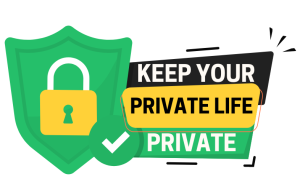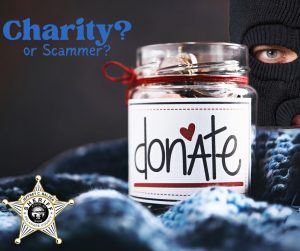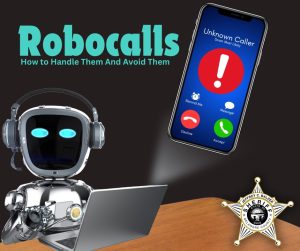Whether you are a child or an adult, there are predators and potentially inappropriate content that can be very harmful to unsuspecting users. It is important to know the signs of scammers in online conversations and how to keep you and your family safe.
Here are some important points (for all ages) to remember to be safe online:
- Be careful who you talk to online – People you don’t know should not be contacting you.
- Be cautious with friends you meet online – Talk to a trusted adult about what constitutes a healthy relationship.
- Take a break – After taking a break from social media, maybe talk to a friend if you still want to share a post with personal information or something that could be inappropriate. You might change your mind or regret posting it later.
- Don’t engage in cyberbullying – Even if you don’t like someone, it’s never OK to be mean. Sometimes, we do not think we are doing anything wrong when we re-share pictures of someone else or “liking” someone else’s mean post because we did not take the photo or share the mean post. We might think that since we received the picture from another person and are just forwarding it to our friends, we are not the ones who caused the harm. However, when we engage in behaviors such as making mean comments, liking rude comments, re-sharing embarrassing content of others, or any behavior that can cause harm to a person, we also become bullies.
- Speak to a safe adult when you need help – Even if you just need someone to talk to, adults can help!
Maintain Online Privacy and Safety |
|
OK to share: |
NOT OK to Share: |
|
|
IMPORTANT:
Online information can: spread quickly and to a lot of people, reach people that you don’t want it to, and end up somewhere unexpected. So be careful what you share. Not everyone online has bad intentions, but you should still be careful when talking to people you don’t know. And even if the request doesn’t come from an adult, you shouldn’t meet offline.
NEVER share telephone or cell numbers, home addresses, account passwords, photos, or emails. Revealing personal information and photos can put your privacy (and safety) at risk. YOU are the first line of defense against online threats.
Cyberbullying
What is Cyberbullying? It is exactly what it sounds like – the combination of bullying and technology.
Examples:
- sending mean text messages
- spreading rumors online
- creating fake profiles to make fun of someone
- recording and posting fight videos
- photoshopping pictures to make someone look bad
- trash-talking someone in an online game
- re-sharing inappropriate/compromising pictures of someone else
- harassing someone to the point where they hurt themselves or others
If you or someone you know is being cyberbullied, here are some steps you can take:
- Don’t respond to the messages – that will only make it worse.
- Block the bully – Most websites and cell phone companies have options for blocking other users.
- Set up new accounts – Only give the new account information to people you trust.
- Report it to the website – Most websites have ways to report cyberbullies and will remove offensive posts.
- Tell an adult you trust – Adults don’t always have all the answers, but they want to help!
- It can be challenging to talk to an adult because you might fear that the bullying will get worse for being a “tattletale,” or you may feel embarrassed. Maybe you are concerned that your phone will be taken away. Sometimes it is hard to talk to an adult, and sometimes it can be hard to identify an adult who can help you. If this is the case, a coach, teacher, or nurse could be a good option. But remember, if someone is being hurt, it’s never wrong to tell an adult. Adults can help by:
- Listening to you – Sometimes just talking about it can help.
- Saving evidence – They can help you figure out if you need to save the messages and who to report them to.
- Talking to the school – If you’re being bullied by a classmate, your teachers should know so they can help protect you during the school day.
- Setting up new accounts for you – You’ll especially need their help if you need to change your cell phone number.
- Finding other solutions that you feel comfortable with.
- Providing emotional support to navigate this difficult time.
Even if you haven’t been cyberbullied yourself, you might have seen it happening to other people. Ignoring it makes you a bystander.
Bystanders are sometimes afraid to speak up because:
- They think the bully might target them next
- They don’t think adults can help
- They don’t want to be seen as a tattletale
- It can be scary to say something
If you see cyberbullying happening, you do have the power to stop it, and can help to protect someone from being hurt:
- Show support for the person being bullied – This might mean making an extra effort to be nice to them, sending them a friendly message, or even just sitting with them at lunch.
- Refuse to join in the cyberbullying – Don’t just ignore it; make it clear you won’t participate in it because it’s wrong.
- Tell the cyberbully to stop, but only if you feel safe doing so – Bullies continue being mean when nobody stops them, so make sure they know you don’t support what they’re doing.
- Report the cyberbullying to an adult – This could be your parent, a family member you trust, or a teacher at school.
Gaming
It’s ok to enjoy gaming, and there are lots of ways to play different games. There are also lots of ways to get into trouble or get hurt or bullied, even as adults. Here are a few tips to help you stay safe while enjoying game time with friends:
- Choose a safe username
- DO NOT include: full name, school name, date of birth, address or town you live in, phone number
- Be careful what you share
- DO NOT share your address, phone number, where you go to school or work, or your full name
- Think about who you’re playing with
- Most online games are open to everyone – which means the person you are playing with could be much younger or older than you.
- Things to remember while playing online:
- you can report and mute anyone abusive, threatening, or who tries to bully you
- people might not always be honest about who they are
- be careful of scams, don’t accept gifts or offers that seem too good to be true
- be nice to the people you’re playing with, even if they’re not as good at the game.
- you can report and mute anyone abusive, threatening, or who tries to bully you
- Things to remember while playing online:
- Most online games are open to everyone – which means the person you are playing with could be much younger or older than you.
There can be times when people use games to ask children and young people to share sexual pictures or nudes. People who do this might make you feel like you can trust them, ask you to keep things secret, or give you compliments or gifts. This is called grooming.
Someone grooming you might flatter you, here are some red flags to look out for:
- If an adult acts interested in a romantic relationship with you or offers you a job without reaching out to your parents/caregivers for their permission.
- If you meet a very cute person your age & things move super-fast right after you start chatting (sometimes people use other people’s pictures to create a fake account & to groom teens)
- Making the relationship extremely sexual (asking you a lot of questions about sex, complementing you mostly about your looks/image, and/or sexualizing most conversations).
- Isolating you from your friends and family.
- Changes in temperament (sometimes they’re nice and sweet and other times they’re angry, controlling, or jealous).
- Asking you to keep secrets (your relationship, conversations, etc.).
- Making you feel like they are the only one who understands you.
- Overall, you feel unhappy, confused, and guilty about the relationship
Here is what you can do:
- Don’t engage with them
- Block or unfriend them
- Don’t meet them offline
- Tell an adult you trust
- Report to the website/app and the CyberTipline
- Don’t delete your account
For moms and dads looking for more information on how to get involved in your child’s digital life and how to keep them safe, visit: internetmatters.org
Scams
The internet doesn’t keep things private just because you want it to. You should even be careful about what you post when using apps that promise anonymity, such as Discord, Whisper, or Snapchat. Privacy cannot be guaranteed online.
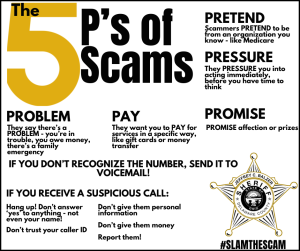
You should not share information about your life that should be private because this can lead to harassment, blackmail, and/or stalking.
Be careful about how much you share, online information can:
- Spread quickly and to a lot of people.
- Reach people that you don’t want it to reach.
- Be captured without you noticing. You do not know if someone took a screenshot of your info, pictures, or video.
| To maintain privacy and safety, do not: |
|
| What should you do? |
|
Type of Scams |
||
Romance |
 |
Someone contacts you on social media – and they’re interested in getting to know you. Or maybe you meet someone special on a mobile app. They constantly compliment you, tell you how beautiful/handsome you are and soon they want to write you directly or start talking on the phone. They say it’s true love, but they live or work far away.
Then they start asking for money. Maybe it’s so they can visit you. Or they’ve had a family emergency or something else urgent. Scammers of all ages, genders, and sexual orientations make fake profiles. They use stolen pictures of real people, even those in the military. They build a relationship with you and may even pretend to plan a wedding or life with you – before they disappear with your money. Never send anyone cash or pay with gift cards, wire transfers, or cryptocurrency to an online love interest. |
Medicare |
|
You get a call, text, or see an ad offering you big discounts on health insurance. Or maybe someone contacts you out of the blue, says they’re from the government, and asks for your Medicare number to issue you a new card.
Scammers follow the news, they know when it’s Medicare open season. They want to get your Social Security number, financial account numbers, or insurance information. Think about these questions: does it sound too good to be true? Is that “government official” really from the government? Do you have to get a new health insurance card? The answer to all three is almost always no. Before you share your information, call Medicare at 1-800-MEDICARE. |
Charity |
|
Someone contacts you for a donation to their charity. It sounds like a group you’ve heard of, it seems real, and you want to help.
Charity scammers want to get your money quickly, causing them to pressure you to donate right away. They often refuse to send you information about the charity or answer your questions about what the money will be used for. Don’t trust your caller ID. Scammers use technology to make any name or number appear on the caller ID (some even make it look like the Sheriff’s Office is calling!) Do your research to see if the charity is real. Tell callers to send you information by mail. |
“You’re A Winner!” |
|
You get a call, letter, email, or text saying: “You’re A Winner!” You’ve won a vacation, lottery, or sweepstakes! You’re excited, the caller is excited and they can’t wait for you to get your winnings… but, there is a catch.
There’s a fee, taxes, or customs duties to pay. They ask for your credit card number or bank account information. They insist you can only pay with cash, gift cards, or wire transfers. If you pay a scammer or share information, you lose. There is no prize and you will probably get requests for more money, stating there are more fees. |
Robocalls |
|
You get a call, you don’t recognize the phone number, you answer anyway, and either a person answers or it’s a computerized voice. They will repeatedly ask “can you hear me,” because they want to record you saying “yes.”
It can be tempting to take the scammer for a ride, but DON’T! Scammers can record your voice and use AI to sign you up for things with verbal consent you did not give. Engaging with them only encourages scammers to think you were willing to answer the phone once, so you may end up with an increase in scam calls. Hang up on unwanted calls and ignore unexpected texts. Never click on links, you could be giving personal information unknowingly.
Learn more about what you can do to keep your family safe with tips from the Ohio Attorney General’s Office (Beware-of-phone-and-text-scams) |
Warrant Scam |
|
Have you ever gotten a call saying you have a warrant for your arrest unless you send money?
The caller may seem very convincing, even giving you an officer’s name or unit number. But don’t be fooled. No law enforcement office will ever call you saying you have a warrant, and there is no way to buy your way out of a warrant or clear a warrant without a judge’s approval. Never wire money, send gift cards, or give any financial information. |
If you spot a scam, report it to the Ohio Attorney General’s Office website or call 800-282-0515.
You can also report scams through our office, FBI.gov or ic3.gov
Sexting
Sexting is the sharing of nude or suggestive pictures and videos through text messages. It can also mean having sexual conversations in text messages or while online. About 19% of teens are sexting. Sextortion is a form of child sex exploitation where children are threatened or blackmailed, most often with the possibility of sharing with the public a nude or sexual image of them, by a person who demands additional sexual content, sexual activity, or money from the child. Multiple tactics are used by online predators: the “I’ll show you, if you show me first” tactic, pretending to be from a modeling agency, and using false online identities to contact a minor. They may pretend to be the same age or younger and/or a member of the opposite sex to gain access to other minors’ photos, this is called Online Enticement.
Getting a request to sext might make you feel:
- Flattered, because it means that someone thinks you’re attractive
- Pressured, especially if it comes from a boyfriend, girlfriend, or crush
What are some of the consequences of sharing a photo?
- It can get lost or misplaced.
- It can be shared without your permission.
- It can become a source of embarrassment, shame, and/or guilt.
- It can result in rumors, gossip, and/or cyberbullying.
- It can result in legal consequences.
- It can result in blackmail to obtain more content to get money. This is a crime, and it’s called sextortion.
- some teens have been suspended from class, sports teams, and other activities
- others have been charged with crimes and have had to complete mandatory community service
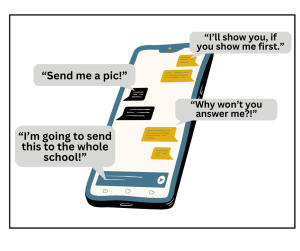
What if I already sent a picture?
If you already sent a sext, do not feel guilty! Steps you can take to help make the situation better follow below.
-
- First, find out which websites the image is on and file a complaint.
- Then: Take it Down – NCMEC is here to help and has information and tools that can give you steps to take to remove content or stop circulation. At NCMEC.org you can find information like how to request companies remove content and Take it Down is an anonymous, free service that can help you remove or stop the online sharing of nude, partially nude, or sexually explicit images or videos taken of you when you were under 18.
- Contact law enforcement or file a report at CyberTipline.org.
- It’s important to remember that you’re not alone – this has happened to other teens and adults.
- Reach out to a friend, a counselor, or another adult you trust.
- You can also reach out to NCMEC for help or support.
You have the strength to move past this!
Red Flags when it comes to online relationships:
- Sends pictures of themselves, especially in little or no clothes
- Wants to talk to you about sex (and isn’t someone like a doctor or an educator for health or education purposes)
- Asks you to send them pictures of you
- Asks to meet you in person
- Someone who wants to follow ALL of your accounts/profiles
- Someone who asks lots of personal information like where you live or go to school
- Someone who gets mad at you when you’re not online, talking to them
- You start to feel like this new online friend is the only person who cares about you and you feel disconnected from other friends and family members
If you notice any of these things happening, you should stop talking to the person and tell a trusted adult (it doesn’t have to be a parent!). They may ask you to show them the messages, and that may be embarrassing but know that it’s not your fault. This person was lying to you, and that’s THEIR fault.
If you’re feeling stressed, confused, or otherwise unwell, don’t be afraid to reach out to friends or trusted adults, like a teacher, counselor, coach, or mentor — it doesn’t have to be a parent if you’re not ready to talk to them about it yet. Remember, if there’s an inappropriate image of you online, you’re not the first. Others have been in the same situation and overcome it, and so will you!
Identity Theft
Identity theft happens when someone takes your name and personal information (like your social security number) and uses it without your permission to do things like open new accounts, use your existing accounts, or obtain medical services.
Warning Signs of Identity Theft:
-
- Bills for items you did not buy
- Debt collection calls for accounts you did not open
- Information on your credit report for accounts you did not open
- Denials of loan applications
- Mail stops coming to or is missing from your mailbox
How Identity Theft Happens:
-
- Steal wallet or purse to get ID, credit, or bank cards
- Go through your trash to retrieve bank statements or tax documents
- Install skimmers at ATMs, cash registers, and fuel pumps to digitally steal information from your bank card
- Get personal information from your phone when you use public Wi-Fi
- Use “phishing” to get information from you through fraudulent emails, texts, or phone calls
- Look through your social media accounts to find identifying information in posts or photos. Or they may ask you for personal information in online quizzes and surveys (like the ‘fun’ quizzes on Facebook to find out “What type of dog matches your personality.”)
How to Protect Yourself from Identity Theft:
-
- Do not answer phone calls, texts, social media messages, or emails from numbers or people you do not know.
- Do not share personal information like your bank account number, Social Security number, or date of birth.
- Collect your mail every day, and place a hold on your mail when you will be on vacation or away from your home.
- Review credit card and bank account statements. Watch for and report unauthorized or suspicious transactions.
- Understand how ATM skimming works and how to protect yourself.
- Learn when it is safe to use a public Wi-Fi network.
- Store personal information, including your Social Security card, in a safe place. Do not carry it in your wallet.
What to do if your Identity is Stolen:
-
- Call the companies where you know fraud occurred
- Place a fraud alert and get your credit reports
- Report Identity Theft to the FTC*
- File a report with local law enforcement
- Close new accounts opened in your name
- Contact your local Social Security Office
*For a complete ‘to-do’ list visit the Federal Trade Commission website.

